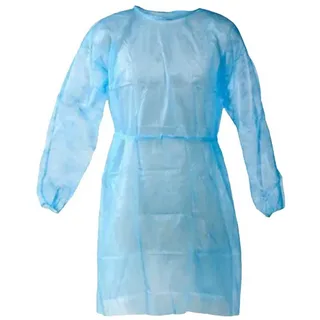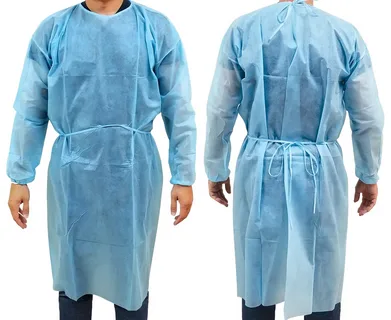Disposable gowns are an essential protective garment in various industries, including healthcare, food service, and manufacturing. Choosing the right gown is crucial to ensure the safety of workers and prevent the spread of contaminants. This guide will walk you through the key factors to consider when selecting the best gowns for your specific needs.
Understanding the Importance of Choosing High-Quality Gowns
When it comes to selecting gowns, the quality of the product plays a crucial role in ensuring optimal protection for both the wearer and the environment. Here are some key points highlighting the importance of choosing high-quality gowns:
High-quality gowns provide superior protection against contaminants and fluids
Gowns that are made from high-quality materials offer better protection against various contaminants and fluids, including blood, chemicals, and biohazards. This is especially important in healthcare settings, laboratories, and cleanroom environments where the risk of exposure to infectious agents is high.
Investing in high-quality gowns can reduce the risk of cross-contamination
By choosing gowns that meet stringent quality standards, you can minimize the risk of cross-contamination between different work areas or individuals. High-quality gowns are designed to provide an effective barrier against harmful pathogens, reducing the chances of spreading infections.
Factors to Consider When Selecting Gowns for Your Needs
Choosing the right gown is essential to ensure the safety and protection of both the wearer and those around them. Here are some key factors to consider when selecting gowns:
 Level of Protection
Level of Protection
One of the most important factors to consider is the level of protection needed for the specific task or environment in which the gown will be used. Different gowns offer varying levels of protection against fluids, contaminants, and other hazards. Be sure to choose a gown that meets the required safety standards for the task at hand.
Comfort and Breathability
In addition to protection, it is important to consider the comfort and breathability of the gown material. Gowns that are comfortable to wear for extended periods of time can help decrease fatigue and increase productivity. Look for materials that are lightweight, breathable, and non-restrictive for the best comfort.
Different Types of Materials Used in Gowns
When it comes to choosing the best gowns for your needs, understanding the different materials used in their construction is crucial. Here are some common materials used in gowns:
Polyethylene
Polyethylene is a lightweight and inexpensive material commonly used in gowns. It provides basic protection against fluids and contaminants but may not offer the same level of durability as other materials.
Polypropylene
Polypropylene is a popular choice for gowns due to its excellent fluid resistance and breathability. It is a durable material that can provide reliable protection in various settings.
SMS Fabric
SMS fabric, which stands for Spunbond-Meltblown-Spunbond, is a nonwoven material that offers a good balance of protection and comfort. It is highly breathable, fluid-resistant, and provides a barrier against contaminants. Each of these materials has its own set of advantages and considerations, so it’s essential to choose a gown that best suits your specific needs and requirements.
How to Properly Fit and Size Gowns?
Ensuring that you properly fit and size your gowns is crucial in maximizing their effectiveness and comfort. Here are some key steps to follow:
1. Check the Sizing Chart
Gowns come in various sizes, so it’s essential to refer to the manufacturer’s sizing chart to determine the right fit for you. Pay attention to measurements such as chest width, sleeve length, and gown length to ensure a proper fit.
2. Consider Mobility and Comfort
When trying on a gown, make sure you can move freely and comfortably while wearing it. The gown should not restrict your movements or feel too tight in any area. Opt for a size that allows for ease of movement without excess fabric that could get caught on objects.
3. Adjustments and Fastenings
Check if the gown has adjustable features such as ties or elastic bands that allow you to customize the fit. Secure fastenings are essential to prevent the gown from slipping or coming undone during use. Make necessary adjustments to ensure a snug yet comfortable fit.
4. Proper Coverage
Verify that the gown provides adequate coverage for the intended use. Ensure that it fully covers your torso, arms, and legs without any gaps that could expose you to contaminants. The gown should also fit snugly around the neckline and cuffs to prevent fluids from seeping in. By following these steps, you can ensure that your gown fits properly, offering you the necessary protection and comfort for your tasks.
Key Features to Look for in Disposable Gowns for Maximum Protection
When choosing disposable gowns for protection against contaminants and fluids, it is essential to look for key features that ensure maximum safety and effectiveness. Here are some important features to consider:
Taped Seams
Taped seams provide added strength and protection by preventing liquid penetration through the seams of the gown. This feature helps to maintain a barrier between the wearer and potentially hazardous materials, reducing the risk of contamination.
Thumb Loops
Gowns with thumb loops offer a secure fit and added coverage for the hands and wrists. This feature helps to ensure that the gown stays in place during movement, preventing exposure to contaminants and providing a more secure protective barrier.
Fluid Resistance
Look for gowns that offer high levels of fluid resistance to protect against splashes, spills, and other liquid hazards. Gowns with fluid-resistant properties are crucial for maintaining a clean and safe environment, especially in healthcare and laboratory settings.
Breathability
While protection is paramount, it is also important to consider the breathability of the gown material. Gowns that are breathable allow for greater comfort during extended wear, reducing the risk of heat stress and discomfort for the wearer.
Proper Care and Maintenance of Gowns to Ensure Durability
Proper care and maintenance of gowns are essential to ensure their durability and effectiveness in providing protection. Here are some guidelines to follow:
Follow Manufacturer’s Instructions
It is crucial to follow the manufacturer’s instructions for washing and storage of gowns in order to prolong their lifespan and maintain their effectiveness in providing protection. By carefully adhering to these guidelines, you can ensure that the gowns retain their integrity and continue to offer the necessary barrier against contaminants. Proper washing techniques and storage procedures can also help prevent any damage or compromise to the material, ensuring that the gowns remain safe and reliable for future use. Remember, the manufacturer’s instructions are there for a reason – to help you get the most out of your gowns and keep yourself and others safe.
Regularly Inspect for Wear or Damage
Regularly inspect gowns for any signs of wear or damage. Check for tears, holes, or weakened areas that could compromise the protection provided by the gown. If any damage is found, the gown should be replaced immediately to ensure the safety and well-being of the wearer. It is essential to regularly inspect garments for signs of wear and tear to prevent any potential accidents or injuries. By promptly replacing damaged gowns, you can maintain a high standard of safety and professionalism in your workplace. Remember, the quality of protective equipment directly impacts the level of protection it provides, so it is crucial to address any issues as soon as they are identified.
Dispose of Used Gowns Properly
After use, dispose of gowns properly according to regulations and guidelines. Proper disposal helps prevent the spread of contaminants and ensures the protection of others from potential hazards. By diligently adhering to the recommended care and maintenance measures outlined for your gowns, you can significantly enhance their longevity and efficacy in safeguarding against potential hazards across a wide range of environments and situations.
This proactive approach to upkeep not only prolongs the life of your gowns but also ensures that they continue to deliver the required level of protection when needed the most. Embracing these guidelines serves as a proactive investment in the safety and well-being of both yourself and those around you, underscoring the importance of prioritizing proper care and maintenance practices for your protective gear.
Comparing Gowns vs. Reusable Gowns for Cost-Effectiveness
When it comes to choosing between gowns and reusable gowns, cost-effectiveness is a key factor to consider. Here are some points to help you make an informed decision:
Gowns
Gowns offer convenience as they can be easily discarded after use, eliminating the need for laundry services. They are typically more affordable upfront compared to reusable gowns. For tasks that require frequent gown changes or in high-contamination environments, gowns may be more cost-effective.
Reusable Gowns
While reusable gowns may have a higher initial cost, they can be washed and reused multiple times. For settings where gown changes are less frequent and contamination levels are lower, reusable gowns may be a more cost-effective option in the long run. Investing in high-quality reusable gowns may result in long-term savings, especially for tasks that require extended use of protective attire.
Ultimately, the choice between disposable and reusable gowns depends on factors such as the frequency of gown changes, the level of contamination risk, and budget considerations. It’s essential to assess your specific needs and weigh the pros and cons of each option to determine the most cost-effective solution for your situation.
Conclusion
Choosing the best disposable gowns is a crucial decision for ensuring safety and protection in various settings. By understanding the importance of quality, considering factors like material and fit, and looking for key features, you can select the right gowns for your needs. Proper care and maintenance will also ensure the durability of these gowns. Whether you opt for disposable or reusable gowns, it’s essential to prioritize safety and comfort. With this guide, you can make an informed decision that meets your requirements and keeps you protected.
FAQ’s
What is the typical shelf life of a disposable gown?
The typical shelf life of a gown can vary depending on the material and manufacturer. It is important to check the expiry date on the packaging and follow the manufacturer’s guidelines for storage.
Can gowns be reused or is it single-use only?
Gowns are designed for single-use only to ensure proper protection against contaminants. Reusing gowns can compromise their integrity and effectiveness, increasing the risk of cross-contamination. It is recommended to dispose of used gowns properly after each use.

